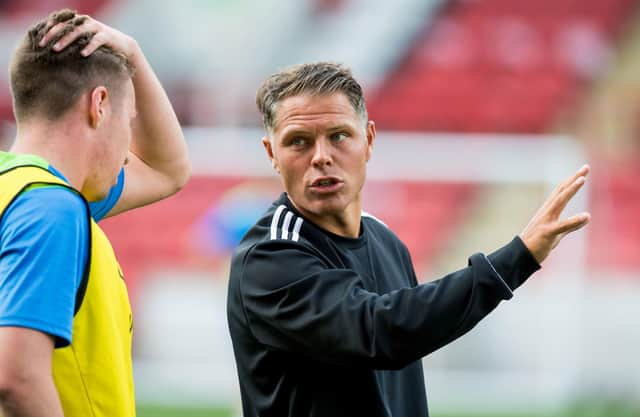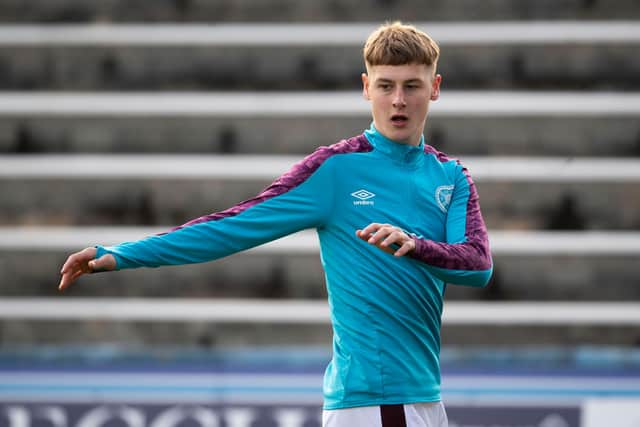How Hearts youngsters are prepared for the first team - training exposure, noise and principles of play


In an in-depth update to supporters, chairwoman Ann Budge said there is a “heavy focus on youth" going forward, while manager Robbie Neilson has spoken at length about the plans for increased integration of the club’s most talented prospects.
Hearts plan to not only run with a reduced squad next season, but a younger one too.
Advertisement
Hide AdAdvertisement
Hide AdIn the Championship, the team’s average age was 28.5. Teenagers played fewer than 400 minutes in all competitions. Harry Cochrane, who recently turned 20, Scott McGill and Fraser Pollock were the trio used.


Neilson has admitted that has to change.
Plans are in place for the likes of Connor Smith, Harry Stone and McGill to gain first-team exposure in the Premier Sports Cup. Behind them, Pollock is leading the way of academy talents.
Reality check
The man helping those teenagers make that step up is John Rankin.
The under-18 boss is unsure if reserve football will be operational next season which makes those moments where individuals train with the first-team crucial.
Advertisement
Hide AdAdvertisement
Hide Ad"That’s hugely beneficial in the player’s development, competing with Steven Naismith, John Souttar, Peter Haring,” Rankin told the Evening News.
"They come with a 15, 16-year-old body and it’s ‘how do I compete with these guys, how do I move the ball as quick’. It gives them a reality check on where they actually are.
"Sometimes a wee bit of realism in their development becomes really important.
He added: "When the manager brings them over it is massive in their development and all about catching the manager’s eye and doing the right things. Sometimes when the players come off they think ‘wow, how good was that kid?’.
Advertisement
Hide AdAdvertisement
Hide Ad“As soon as you can get a first-team player noticing how good you are doing that becomes important. They begin to ask and warm to you.
"Knowing the game the way I do, first-team players welcome kids who are prepared to work hard and roll their sleeves up. It’s all about attitude with them."
Less cups, more talking
That attitude also relates to handling the demands, the pressure and intensity. The step between development and first-team football sees the noise, quite literally, increase.
For Rankin, it is an aspect of the game which has changed from when he was breaking through and something he is very wary of.
Advertisement
Hide AdAdvertisement
Hide Ad“First of all, when they come into the building you have to get them out of their shell and speak and for people to warm to them,” he said.
“You’re trying to get them to go over into that environment and become accustomed to it really, really quickly which becomes hard because all kids come in here and none of them will raise their voice.
"I remember John Brown throwing cups round at half-time when I was a kid coming through. That doesn’t happen now. It mainly comes from me because the kids won’t shout at one another.
"Having to raise a voice and get the best out of them becomes difficult because they are so quiet these days because society is different.
Advertisement
Hide AdAdvertisement
Hide Ad"When they go over to that first-team environment they’ve not just got a coach barking orders at them. You’ve got the senior players, Nasimith, Souttar, Craig Gordon. That’s when it becomes, ‘wow, I need to stand up to this and I need to be able to handle the pressure of giving the ball away and how quickly I can go get it back’.
"Sometimes it becomes silent football at under-18s because they don’t talk to one another. But when they go over there it becomes that environment where it is demanding, constant and intense.
"If I can try and put a wee bit of that into them at under-18 level they can become accustomed to that really, really quickly.”
Creating a winning mentality
In terms of on the pitch, and the style from one level to another, Rankin reveals the “principles of play” remain the same.
Advertisement
Hide AdAdvertisement
Hide Ad“It has to be that way," he said. "That’s the way the manager and sporting director want it.
"At this level more teams will try to build the play and try to score the perfect goal. Whereas at first team level that doesn’t really happen, you need points on the board.
"The kids need to know, yeah, it’s about their development, but also the result matters for them because mentally it helps them kick on and strive for the next game.
"We all say in youth football the result doesn’t matter. It shouldn’t matter for the coach but it should really matter for the players. Ultimately creating that mentality of winning games, winning challenges, winning a header, that matters.”
Loan benefits
Advertisement
Hide AdAdvertisement
Hide AdRankin spent most weekends last season at games involving the club’s loanees.
There has been much debate regarding the benefits of Colts teams in the leagues but the Hearts coach knows just how important and formative loan spells can be for youngsters.
“Personally I think it is massive,” he said, “If they are not ready for the first team at 17, 18 and they are going out on loan then great because they are getting game time at other clubs.
"Sometimes going out on loan and not getting game time makes them more hungry.
Advertisement
Hide AdAdvertisement
Hide Ad"They have got no given right to go and play because they are a Hearts player. They have to go to these clubs and earn the right to play. Sometimes that can be the making of them when they realise they have come through the academy, they get everything, and they go out on loan and suddenly find themselves not playing.
"They come back and they are hungrier having realised how hard it is out there.
"All their work is then based on Saturday at 3pm. When they are in the reserve team and the 18s it is mainly about development but there is no time for that when they get to League One and League Two.”
A message from the Editor: Thank you for reading this article. We're more reliant on your support than ever as the shift in consumer habits brought about by Coronavirus impacts our advertisers. If you haven't already, please consider supporting our sports coverage with a digital sports subscription.
